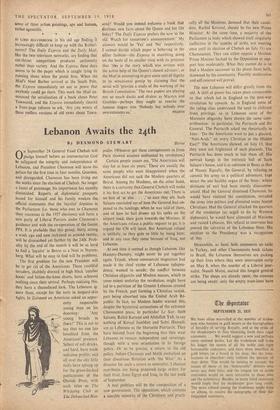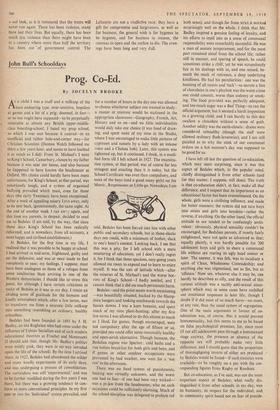Lebanon Awaits the 24th
By DESMOND STEWART Beirut
ON September 24 General Fuad Chehab will pledge himself before an intersectarian God to safeguard the integrity and independence of Lebanon, and President Chamoun will leave his palace for the first time in four months. Guarded, and disregarded, Chamoun has been living out the weeks since the election of Chehab. No longer a fount of patronage, his importance has steadily diminished. Reports of diplomatic passports issued for himself and his family weaken the official statements that the 'loyalist' deputies in the Parliament (i.e. those who owe to Chamoun their successes in the 1957 elections) will form a new party of Liberal Patriots under Chamoun's guidance and with the co-operation of the fascist PPS. It is probable that this group, thirty strong a week ago and now reckoned as around twenty, will be diminished yet further by the 24th. Prob- ably by the end of the month it will be as hard to find a 'loyalist' in Beirut as a Nazi in Nurem- berg. What will be easy to find will be problems.
The first problem for the new President will be to get rid of the Americans. These youthful invaders, shabbily dressed in high black 'combat boots' and below-the-knee shorts, have achieved nothing since their arrival. Perhaps realising this, they have a shamefaced look. The Lebanese ig- nore them, except for the tarts in leopard-skin tights. In Zaitound an American asked an appar- ently respectable young man on his
doorstep : 'Any young • broads in there'?' This is not for say that no one has benefited from the Americans' presence. Sellers of soft drinks, and hard, have made welcome profits; and all over the city little stalls have sprung up for the green-backed publications of the Obelisk Press, with such titles as The Whipping Club or The Debauched Has-
podar. (Whoever got these consignments in from Paris showed acumen unbiunted by revolution.)
Certain people assure me, 'The Americans will stay for at least six years.' These are usually the same people who were disappointed when the Americans did not sack the Moslem quarters of Beirut. Among the Moslems, on the other hand, there is a certainty that General Chehab will make it his first act to get the Americans out. There is no hint of 'or else . . . ,' so sure they are. Saeb Salaam reminded me of how the General had ob- jected to the landings, when he was told of them, and of how he had drawn up his tanks on the airport road, their guns towards the Marines. If the Americans refuse a public request to go, it is argued the UN will insist. But American refusal is unlikely, as they gain so little by being here; and in any case they came because of Iraq, not Lebanon.
At one time it seemed as though Lebanon, like Humpty-Dumpty, might never be put together again. Tripoli, whose commercial stagnation had made it the chief victim of Lebanese indepen- dence, wanted to secede; the conflict between Christian oligarchs and Moslem masses, which to some extent underlay the revolution, might have led to a partition of the Greater Lebanon created by the French, part forming a Christian sanjak, part being absorbed into the United Arab Re- public. In fact, no Moslem leader wanted this, despite the hysterical accusations of the extremer Chamounist press, in particular Le Soir. Saeb Salaam, Rahid Kerame and Abdullah Yafi, to say nothing of Kemal Jumblatt and Sabri Hamadi, are as Lebanese as the Maronite Patriarch. They have insisted from the beginning that they want Lebanon to remain independent and sovereign, though with a new orientation in its foreign policy. Or to be precise, a return to the old policy, before Chamoun and Malik embarked on their disastrous flirtation with 'the West.' As a douceur for such a return to neutrality, Lebanese merchants are being promised large orders for their fruit, from Egypt and Iraq, in the last week of September.
A real problem will be the composition of a new government. The opposition, which contains a sizeable minority of the Christians and practi-
cally all the -Moslems, demand that their candi- date, Rashid Kerame, should be the new Prime Minister. At the same time, a majority of the Parliament (a body which showed itself singularly ineffective in the months of strife, not meeting once until its election of Chehab on July 31) are Chamounists. They can either oppose a Moslem Prime Minister backed by the Opposition or sup- port him moderately. What they cannot do is tto find a Moslem successor to the pliant Sami Solh, disowned by his community. Possibly moderation and self-interest will prevail.
The new Lebanon will differ greatly from the old. A shift of power has taken place comparable to that which led in England to the post-war revolution by consent. As in England some of the ruling class understood the need to abdicate from privilege, so in Lebanon some of the Maronite oligarchy have shown the same com- prehension: in particular, the Patriarch and the General. The Patriarch asked me rhetorically in June : 'Do the Americans want to put a placard, "Anti-Arab," on every Christian in the Middle East?' The Americans showed, on July 15, that they were not frightened of such placards. The Patriarch has done much to tear them off. His portrait hangs in the entrance hall of Saeb Salaam's house, and is as common in Basta as that of Nasser. Equally, the General, by refusing to commit his army to a political adventure, kept intact the one healthy organ of the State : where divisions of sect had been sternly discounten- anced. Had the General dismissed Chamoun, he would have violated the constitution, intruded the army into politics and alienated many honest Christians. Had the General attacked the quarters of the revolution (as urged to do by Western diplomats), he would have alienated all Moslems and ruined Lebanon. His refusal to intervene has proved the salvation of the Lebanese State. His election to the Presidency was a recognition of this.
Meanwhile, as Sami Solh announces an exile to Turkey, and other Chamounists book tickets to Brazil, the Lebanese themselves are picking up their lives where they were interrupted early on May 8. when the murder of a Liberal jour- nalist, Nassib Matni, started this longest general strike. The shops are already open; the cinemas are being swept; only the empty tram-lines have a sad look, as it is rumoured that the trams will never run again. There has been violence, many have lost their lives. But equally, there has been much less violence than there might have been in a country where more than half the territory has been out of government control. The Lebanese are not a vindictive race; they have a gift for compromise and forgiveness, as well as for business; the general wish is for bygones to be bygones, and for business to resume, the cinemas to open and the curfew to die. The even- ings have been long and very dull.



































 Previous page
Previous page